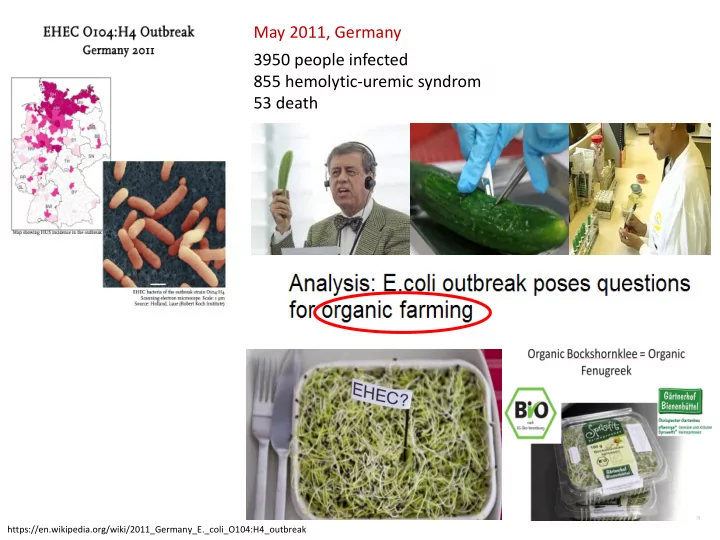

May 2011, Germany 3950 people infected 855 hemolytic-uremic syndrom 53 death https://en.wikipedia.org/wiki/2011_Germany_E._coli_O104:H4_outbreak
Sample Chicken steak sample 1 A Tomato salad sample 2 B Raw chicken meat sample 2 C Raw chicken meat sample 3 D Patient 1 E Patient 2 F
Antibiotic susceptibility testing METHODS Disk difusion method - qualitative method Dilution methods - quantitative method Broth dilution method Agar dilution method 3
Disk difusion method Petri dish with Mueller-Hinton agar and tested antibiotics susceptible Disk with antibiotic resistant Inhibition zone 4
Broth dilution method – MIC testing MIC – minimal inhibitory concentration (ug/ml, mg/l) Microtiter plate 8 x 12 wells 128 32 Mueller-Hinton broth with serial dilution of 64 16 antibiotics and inoculated bacterial strains 32 8 16 4 8 2 4 1 2 0,5 1 0,2 Antibiotic concentrations 5
Disk difusion method Steps: 1. Bacterial culture 2. Inoculum of bacterial culture (1 - 3 x 10 8 cells/ ml) 3. Inoculation of cultivation plates 6
Disk difusion method 4. Application of antibiotic disks 5. Measurement of inhibition zones 6. Interpretation of results – sensitive, intermediate, resistant 7
DILUČNÍ MIKROMETODA - BUJONOVÁ Je používána ke kvantitativnímu stanovení aktivity antimikrobních látek Stanovuje se MIC , tj. nejnižší koncentrace, která viditelně inhibuje růst testovaného mikroorganismu. Sterilní plastová mikrodiluční destička obsahující v jednotlivých mikrojamkách v bujónu rozplněné různé koncentrace antibiotik (v rozsahu obsahujícím brakpointovou koncentraci) je inokulována standardizovanými suspenzemi testovaných bakterií. Antibiotic disk Size of inhibition zone Ammount of Disk antibotic in the R I S disk (μg) No. Abbreviation Active compound resistant intermediate sensitive ≤ 13 ≥ 17 1 AMP ampicillin 10 14 - 16 ≤ 11 ≥ 15 2 S streptomycin 10 12 - 14 ≤ 12 ≥ 17 3 S3 sulphonamides cp. 300 13 - 16 ≤ 14 ≥ 19 4 TE tetracycline 30 15 - 18 ≤ 10 ≥ 16 5 SXT trimethoprim/sulfamethoxazole 1,25/23,7 11 - 15 ≤ 12 ≥ 18 6 C chloramphenicol 30 13 - 17 ≤ 14 ≥ 18 7 KF cephalothin 30 15 - 17 ≤ 13 ≥ 19 8 NA nalidixic acid 30 14 - 18 ≤ 14 ≥ 18 9 CAZ ceftazidime 10 15-17 ≤ 12 ≥ 15 10 CN gentamicin 10 13 - 14 ≤ 13 ≥ 18 11 AMC amoxicillin/clavulanic acid 30(20/10) 14-17 ≤ 16 ≥ 23 12 CIP ciprofloxacin 5 17 - 22 8
Resistance to beta-lactams – production of beta-lactamase Extended-spectrum beta-lactamase (ESBL) E. coli sensitive to cephalosporins E. coli resistant to cephalosporins
Penicillin Penicillin binding protein (PBP) Extended Spectrum Beta-Lactamase
Inhibitor Penicillin Penicillin binding protein (PBP) Extended Spectrum Beta-Lactamase
Double disk synergy test – detection of ESBL production 1… cefotaxime ( CTX, 30 µg) 2…amoxicillin -clavulanic acid (AMC, 30 µg) 3… ceftazidime (CAZ, 30 µg) 12
Double disk synergy test – detection of ESBL production 1… cefotaxime ( CTX, 30 µg) 2…amoxicillin -clavulanic acid (AMC, 30 µg) 3… ceftazidime (CAZ, 30 µg) Positive results Negative result 13
Pulse-field gel electrophoresis 14
Pulse-field gel electrophoresis 15
Recommend
More recommend